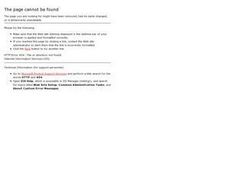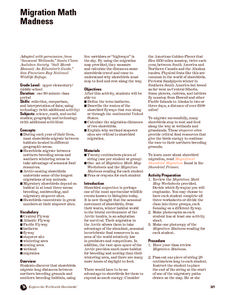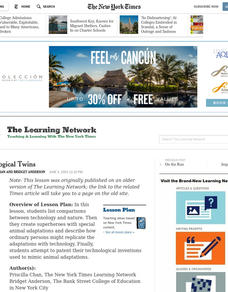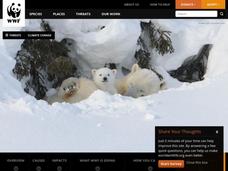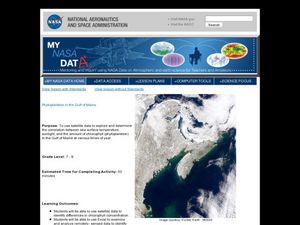Curated OER
Living in the Greenhouse
Students discuss the different types of climate zones found throughout the world. They participate in activities which relate to real events. They make observations and the consequences of their actions on the environment.
Roy Rosenzweig Center for History and New Media
American Indians and their Environment
People could take a page in ingenuity and survival from the Powhatans. Deer skins became clothes, and the members of the Native American group farmed the rich Virginia soil and hunted in its forests for food. Using images of artifacts...
Curated OER
Make a Farm
After a class discussion about where their food comes from learners construct a farm from a print-out (embedded in the plan). They work in groups, and trace a food source from the beginning. For example, they discover how a farmer grows...
K12 Reader
Eastern Woodland Natives
Supplement your social studies instruction with a reading passage about the Eastern Woodlands. After reading the passage, learners respond to five related questions.
Curated OER
Hawk in Flight
Students use information gathered by satellites to explore the migration of the Swainson's hawk from the western border of Minnesota to the southern portion of South America.
Prince William Network
Migration Math Madness
A great way to incorporate math into life science, this lesson has learners measure migratory routes on a map and calculate the actual distance that shorebirds on the routes would cover. Learners compute the distance covered in both...
American Museum of Natural History
Wonderful World of Wasps
Shockingly, wasps sometimes challenge lions as the king of predators! Learners explore the life of a wasp in an interactive online lesson. They read about the characteristics of wasps and then complete activities to learn about their lives.
American Museum of Natural History
Are YOU Cut Out for Antarctica?
Negative 80 degrees Fahrenheit, you say? Scholars complete a quiz to gauge their adaptability to the extreme climate of Antarctica. The quiz scored online gives them feedback of their likelihood of surviving in Antarctica.
Curated OER
Geography Project: Australia
A presentation packed with project ideas and research questions encourages viewers to use images to describe Australia's climate, leisure activities, location, interesting facts, culture, and landmarks. Learners combine technology and...
K12 Reader
Taiga Ecosystems
Introduce your class to another type of ecosystem, the taiga ecosystem, through a reading passage. Class members read the text and then respond to five reading questions about the content of the passage.
Pearson
Making Inferences
The ability to make inferences is an important skill. Provide your class with some practice. This resource includes several different passages with which learners are required to practice inferring. They read each passage and respond to...
Curated OER
Technological Twins
Learners list comparisons between technology and nature. Then they create superheroes with special animal characteristics and describe how ordinary persons might replicate the changes with technology.
Curated OER
Wetland Metaphors
Learners describe the characteristics of wetlands and identify their ecological functions. They inspect items and use them to create metaphors about wetlands.
Curated OER
Climate Change And Disease
Students consider the role of climate change in the occurrence of vector born diseases such as malaria. In small groups, they research a specific vector to complete an information chart on climate changes in the region where the vector...
Curated OER
Going Batty
In this bats worksheet, students read 10 facts about bats. Students also choose the correct words from the box to complete the sentences.
Curated OER
Our Natural Resources
Your class will learn about natural resources and man-made items and differentiate between them. They chart resources from seven pictures and explain how each natural resource is used.
Curated OER
Dry Season and 'Green' Season in Costa Rica
Students explore the seasonal changes in Costa Rica. In this dry season activity students use the Internet to locate science data then generate data for precipitation.
Curated OER
Phytoplankton in the Gulf of Maine
Learners use satellite data to see the correlation between sea temperature and sunlight in the Gulf of Maine. For this phytoplankton lesson students use Excel to analyze data.
Curated OER
Landscape Garden Makeover
A project-based learning plan focuses on landscapes in the community. After identifying problems, such as dead trees or misplaced automatic sprinklers, learners design solutions, contact local organizations to fix the problems, and do...
Curated OER
Reading Comprehension 1: Level 9
The Iditarod Trail and the Iditarod Trail Sled Dog Race are the focus of a comprehension assessment. Readers must identify the main idea of the passage, draw inferences, define words using context clues, and identify the organizational...
Curated OER
Introduce Vocabulary: Over in the Meadow (Keats)
If you're reading the classic story Over in the Meadow, consider this strategy to cover vocabulary in context with budding readers. After a brief introduction, listeners raise a hand when they hear each word (bask, burrowed, and cawed)...
K12 Reader
Taiga Ecosystems
After reading a short article about taiga ecosystems, middle schoolers are asked to identify the characteristics of this chilly environment.
DePaul University
Seasons on the Prairie
Fact and opinion passages inform readers about the seasons on the prairie and Zambia in Southern Africa. Then, test scholar's knowledge with multiple choice and short answer questions.
ReadWriteThink
Compare and Contrast
Read about the ways that different cultures set up homes with a set of reading activities. Learners read short paragraphs that cover one or more different ideas, and answer four questions about what they have read, including whether or...
Other popular searches
- Animals in Winter
- Winter Animals Hibernation
- Science Winter Animals
- Winter Animals Preschool
- Winter Animals Adapt
- Animals in Winter Poem
- Active Animals in Winter
- Esl Lessons Winter Animals
- Math Winter Animals
- Michigan Animals in Winter
- Winter Animals Hybernation
- Winter Animals Spanish






